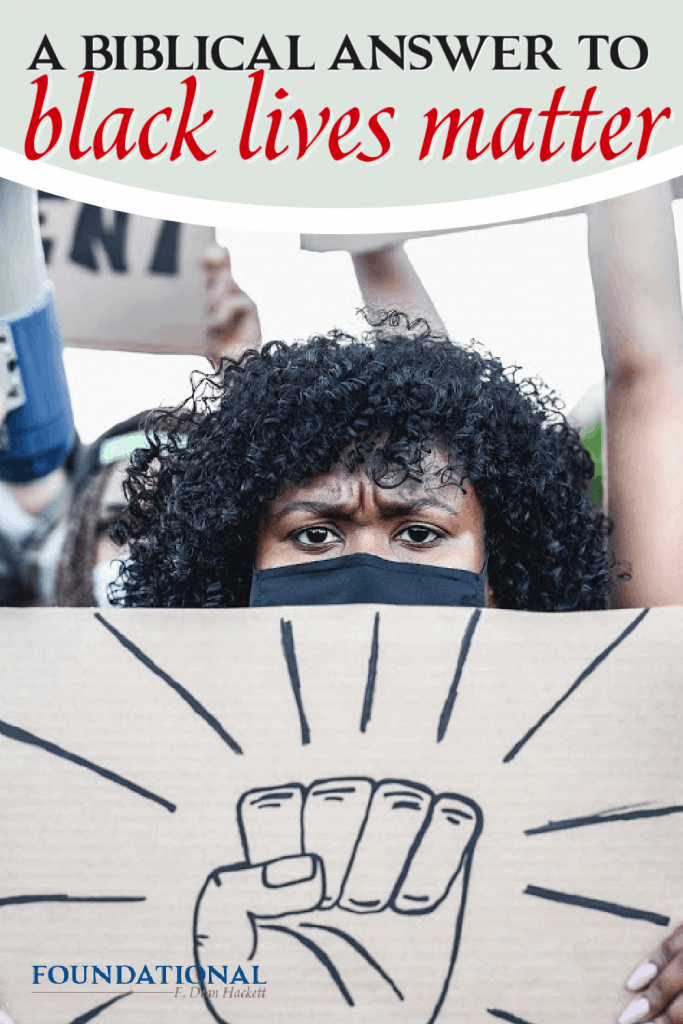A Biblical Answer to Black Lives Matter
I hope you love the products and resources I recommend here at Foundational. It is possible that I get a commission and collect income from the links on this page. Click here for more info.
What do black slavery, the Opium War of China (1839-1860), the Irish potato blight (1847), the New Immigration of the late 19th and early 20th Century, and the Hispanic Immigration of late 20th and early 21st century, have in common?
- The people were searching for relief from poverty and political persecution.
- They faced huge assimilation challenges.
- They experienced racial prejudice.
- They were faced with de-humanizing attitudes.
- The sinfulness of the human heart was exposed.
- All of these challenges came with derogatory ethnic slurs. Names like:
- Chee na
- Chink
- Mick
- Wops
- N****
- White N****
We are facing one of the greatest challenges since the Holocaust of the 1930’s and 1940’s.

Anti-Semitism is rising around the globe at a level not seen since Nazi Germany.
Racial prejudice and rhetoric are reaching destructive levels, from all sides.
Black Lives Matter, Antifa, are in your face every day.
Even inside the Christian community voicing are rising like, theologian James Cone who calls, “White supremacy the American Church’s greatest, original and most persistent sin.” source
Duane Terrence Loynes Sr., in his dissertation to Marquette University for a Doctorate in Philosophy, entitled, “A God Worth Worshiping, Toward a Critical Race Theology”, wrote, “Although the Church has engaged in numerous attempts to remedy racism, theology still seems to witness to a God that stands relatively unopposed to the status quo of racial injustice and marginalization. This dissertation begins with the claim that Christian theology still operates from the normativity of whiteness. I will argue that, although the Church has made admirable progress with regard to racial justice, the attempts have been at the surface: the underlying structural logic of White supremacy remains intact.” source
These are only two voices among many in the Christian community that are declaring the church white supremacist.
A Biblical Answer to Black Lives Matter
You will hear the terms “intersectionality” and “Critical Theory” or “Critical Race Theory.”
They have become vogue inside theological circles and whole movements, like the Southern Baptist Convention, have adopted these as actual doctrinal points.
At face value, that seems wonderful, because racial issues are being addressed.
Do these social reconstructs really address racial reconciliation?
True racial reconciliation can only come when biblical principles are the foundation and Holy Spirit is motivating the steps of action.
Therefore, three questions must be addressed honestly and thoroughly.
- What are the foundational principles of “Intersectionality” and “Critical Theory?”
- How do these theories match with the biblical principles?
- How should biblical principles be applied to racial reconciliation?
WHAT IS THE ORIGIN OF “INTERSECTIONALITY” AND “CRITICAL RACE THEORY?”
Intersectionality has been called a theoretical framework for understanding how aspects of a person’s social and political identity might combine in creating unique manners of discrimination.
It is a theory that seeks to overlap race, gender, sexuality and class to identify systems of discrimination and oppression that individuals may experience.
Kimberle’ Williams Crenshaw, law professor and social theorist, first introduced the theory in a document she wrote for the University of Chicago Legal Form in 1989. It was titled, “Demarginalizing the Intersection of Race and Sex: A Black Feminist Critique of Antidiscrimination Doctrine, Feminist Theory and Antiracist Politics.”
Professor Crenshaw is considered a leading scholar of the Critical Race Theory.
Indeed, the intersectionality theory is founded upon the Critical Theory.
That begs the question what is Critical Theory?
Stanford Encyclopedia of Philosophy (Stanford.edu) describes Critical Theory as follows.
“Critical Theory has a narrow and a broad meaning in philosophy and in the history of the social sciences. ‘Critical Theory’ in the narrow sense designates several generations of German philosophers and social theorists in the Western European Marxist tradition known as the Frankfurt School. According to these theorists, a “critical” theory may be distinguished from a “traditional” theory according to a specific practical purpose: a theory is critical to the extent that it seeks human “emancipation from slavery”, acts as a “liberating … influence”, and works “to create a world which satisfies the needs and powers” of human beings (Horkheimer 1972, 246)… It follows from Horkheimer’s definition that a critical theory is adequate only if it meets three criteria: it must be explanatory, practical, and normative, all at the same time.”
Critical theory is a Marxist-inspired movement of social and political philosophy that originated at the Frankfurt School.
They were critical theorists who drew heavily upon the thoughts of Karl Marx and Sigmund Freud, with a primary goal of philosophy that understands and seeks to help overcome the social structures through which people are dominated and oppressed.
Critical Racial Theory and Intersectionality express concerns for the sociological and racial inequities of history and present-day cultures; and seek to discover solutions to those inequities.
There should be concern for these inequities and they must be addressed.
The “fly in the ointment” of Critical Race Theory and Intersectionality is the fundamental basis for addressing these concerns and their inequities are the same fundamental basis used in communism to address economic concerns.
They are using the same philosophical construct used by Karl Marx, Vladimir Lenin, and Mao Tse Tung.
This very important issue is not being adequately addressed, particularly in theological circles and various church doctrines.
In some cases, it is being totally ignored while these social constructs are being adopted and propagated as Christian values.
This begs yet another question.
Where, in the history of any nation that has adopted these sociological ideas, have freedom and reconciliation come to the people that have suffered racial inequities?
The answer to this important question, “Absolutely not one nation.”
Socialist/communist ideology has no capacity to bring freedom to people.
The fundamental reasoning, philosophy, and social order of Critical Theory does not bring freedom but greater bondage and more discrimination.
Sociological and racial inequities should be a deep concern to a disciple of Jesus Christ.
The discovery of solutions to those inequities and adequately applying those solutions must not be taken lightly or casually.
Discovery and solution must be motivated by the Holy Spirit and God-kind-of-love based upon clear biblical principles; NOT atheistic, humanistic, rationalistic ideology.
That is the subject of our next blog.
Read My Other Articles On This Topic:
A Biblical Answer to Black Lives Matter
Is Social Justice Biblical Justice?
Liberation Theology – Is it Biblical?
Social Justice – A War for Truth
What is the Biblical Basis for Racial Reconciliation?
You Can’t Build a Condominium on a Sandy Beach






